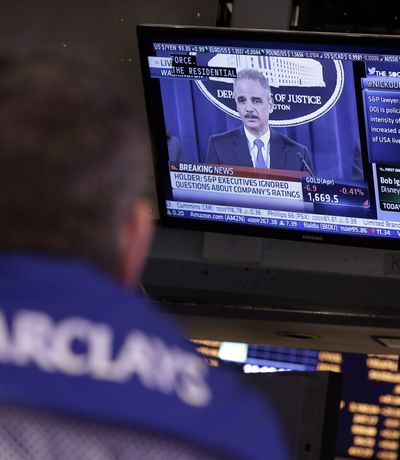Reputation on line in suit against S&P
Ratings agency accused of defrauding investors

WASHINGTON – The Justice Department’s filing of a multibillion-dollar fraud lawsuit against the Standard & Poor’s rating agency this week culminates a massive, multiyear federal investigation code-named “Alchemy,” but it’s only the start of a more public legal battle joined by at least 16 state attorneys general.
The outcome could make or break the reputation of the world’s largest credit-rating agency. It will shed additional light on how credit-rating agencies contributed to the nation’s financial near-meltdown in 2008. It also might test the limits of free speech. At the very least, it will keep lawyers busy for a long time.
“Put simply, this alleged conduct is egregious, and it goes to the very heart of the recent financial crisis,” Attorney General Eric Holder declared Tuesday.
The federal lawsuit filed against the firm formally known as Standard & Poor’s Financial Services, along with its parent company, McGraw-Hill, alleges that the firm defrauded investors by issuing inflated ratings for risky mortgage-backed securities that misrepresented the true credit risks.
The suit further alleges that S&P falsely told investors that its credit ratings were objective and not influenced by potential conflicts of interest, namely that it had compromised its ratings to accommodate Wall Street banks.
Credit-rating agencies serve as a crucial backstop to the U.S. financial system. They provide investors, large and small, a signpost in assessing the likelihood of default by a bond issuer, be it a foreign or local government or a Wall Street bank offering a sophisticated engineered product.
The federal suit alleges that this backstop function by S&P – which touted its gold-plated AAA ratings on mortgage securities as signaling that they could withstand another Great Depression – crumbled as the firm pushed for greater market share and higher profits.
Justice Department attorneys spelled out their case in a painstakingly detailed 119-page complaint filed in Los Angeles, replete with seemingly incriminating email quotations and references to individuals such as “senior executive G” and “senior analyst B,” codes that apparently shield the identities of more than a dozen executives who are now cooperating with investigators.
The department served “hundreds of subpoenas” and analyzed “millions of pages of documents,” according to Stuart F. Delery, the head of the Justice Department’s civil division.
The suit, which seeks damages of $5 billion or more, alleges that S&P executives repeatedly manipulated and refused to update computer models so that they underplayed the perils of subprime and similar brands of risky mortgage securities. Then in 2006 and 2007, when default rates soared, company executives took steps to withhold the truth from the public while helping Wall Street firms avoid massive losses by unloading billions of dollars more in dicey loans, the suit alleges.
Under the current ratings model, Wall Street banks, rather than investors, pay for the ratings. But in the case of the complex bonds in question, the rating agencies also were paid to help pool the mortgages that would underpin the bonds sold to investors.
They essentially were paid to rate the very instruments they were paid to help create.
In a statement, Standard & Poor’s called the federal case “without legal merit” and “unjustified,” and the company has some track record in fending off legal actions because of First Amendment protections for its credit-rating pronouncements. The company says such protections apply because it simply offers opinions.
“A number of court rulings have dismissed challenges made with 20/20 hindsight to a credit rating agency’s opinions of creditworthiness,” the company noted in a lengthy statement.